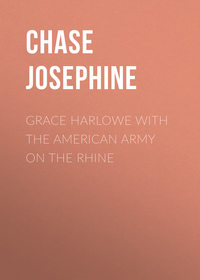 полная версия
полная версияMarjorie Dean, High School Senior
Marjorie smiled ruefully as she read Mary’s uncomplimentary opinion of the French girl and her wise conclusion regarding Mignon and Rowena. Mary Raymond had never forgiven Mignon her transgressions; moreover, she never would forgive her. She wondered what Mary would think when she wrote her chum the information that Mignon had been invited to join the Lookout Club. Mary’s forceful warning against the latter did not tend to lighten the perplexed lieutenant’s own lively apprehension. Suppose her own insistence that they keep their promise to Mr. La Salle were to later enmesh both herself and her friends in some difficult web of Mignon’s spinning? Given that this could easily happen, it might take the greater part of their senior year to extricate themselves from it. On the other hand, membership in the club might have a highly beneficial effect on Mignon. Marjorie fervently hoped that it would. At any rate she had pleaded that Mignon should be asked to become a member of the club, and come what might, she must abide by the consequence of her own act.
CHAPTER VI – STRICTLY LOCAL POLITICS
Marjorie was just putting on her hat preparatory to setting out for school, when Jerry Macy walked in at the open front door. “Thought I’d stroll over for you,” she announced. “I might better say fly than stroll. I ran nearly all the way here so as to be sure to catch you at home.” Jerry’s very manner betokened the fact that she had something on her mind.
“I’m glad you came, Jerry. Captain says we can have the meeting here to-morrow evening. I wish you’d help me invite the girls. I’ll tell Lucy, Rita, Florence, Gertrude and – Mignon. I think I’d better invite them myself as long as the meeting is to be at my house. You can tell the others. But we mustn’t stand here to talk. It’s after one o’clock now.” Seizing her hat, Marjorie hastily slipped it over her curls and the two left the house.
“I’ll cheerfully invite anyone except Mignon,” stipulated the stout girl. “Is Veronica coming?” They had now started down the street toward the high school.
“No.” Marjorie’s face clouded. “She refuses to join our club.”
“Isn’t that too bad?” deplored Jerry in deep disgust. “I suppose it’s on account of Mignon that she won’t belong to the club. I can’t say I blame her much. Daisy Griggs told me this morning that Mignon said she wouldn’t be seen associating with a menial like that Browning girl. Isn’t that the limit? No apology for using slang, either. I mean what I say. There’s just one thing about it, Marjorie, we’ll have to do something to stop Mignon from making such malicious remarks about Veronica. All morning I kept thinking about what Daisy had said. While I was eating luncheon an idea popped into my head. We might as well make a special rule along with the regular club rules that the members must pledge themselves not to gossip or say hateful things about anyone. All the girls except Mignon will live up to it, I know. I’ve thought of another way, too, to keep her from gossiping. You’ll think I’ve surely gone crazy when I tell you. Yet there’s some method in my madness.”
“What is it?” asked Marjorie curiously. She could think of no effectual method of sealing Mignon’s wayward lips.
“Well, the best thing to do with Mignon is to elect her to an office in the club. Then she won’t dare to do anything but behave herself. The eyes of the club will be on her all the time. She’ll just have to walk a chalk line. She’ll do it, too. You know how well she behaved when Laurie gave her back her part in the operetta last Spring. She loves power and position. Make her an officer in the club and she’ll walk softly for fear of putting out her own bright light. What do you think about it, anyway?”
“It’s a good plan,” was Marjorie’s unhesitating answer. “I don’t believe it would be wise to have her for president, though, or even vice-president.”
“No, she’ll have to be secretary or treasurer,” declared Jerry quickly. “In a club of fourteen, four officers will be about as many as we shall need.”
“But suppose the girls don’t care to vote for her?” Tardy remembrance of this obstacle now confronted Marjorie.
“Oh, it will have to be a cut-and-dried election as far as Mignon is concerned.” Jerry grinned cheerfully as she made this bald statement. “You and I will have to do some electioneering. I’ll interview one half of the girls and leave the other half to you. We’d better decide now on the office she’s to have,” she added with the judicial air of a seasoned politician.
“We might propose her for treasurer,” said Marjorie after a moment’s reflection. “Very likely we won’t have much money at first, but it would make her feel more important to take care of it than to be secretary and just set down the minutes of the different meetings.”
“All right, we’ll see to it that she is elected treasurer. I expect it will be some surprise to her. I hope to goodness she appreciates it enough to behave like a Christian. If she doesn’t, you can blame me for the whole thing.”
“It will be just as much my fault as yours if the plan doesn’t work out well. It’s rather queer, Jerry, but just before you came I was wondering whether I had done right after all in proposing Mignon as a member of the Lookouts. I had just decided that I had, when you came and proved it to me by proposing that we elect her to an office in the club. It looks as though there were some hidden influence at work, far greater than we are, which is urging us on to help her find herself. Who knows how wonderfully our little plot may turn out after all?”
“You might better say, ‘Who knows how our little plot may turn out?’” grumbled Jerry. “It reminds me of a problem in algebra. Let X equal the unknown quantity, or rather let Mignon equal the unknown quantity. But let us once more be reformers or die in the attempt. We’ve started the ball rolling, so we’ll have to run along behind it and see that it keeps on rolling in the right direction.”
Their entrance into the school building cut the earnest conversation short. Marjorie left Jerry in the corridor and went on alone to Miss Archer’s office to apprise Lucy Warner of the new project and that the first meeting of the club was to take place at her home on the following evening. There was a distinct tinge of reserve in the green-eyed girl’s greeting, which informed Marjorie that Lucy was still slightly peeved over the incident of the lost letter. Diligent inquiry had failed to bring forth any news of it. It was now over a week since Marjorie had lost it, and there seemed small chance that it would materialize at this late date.
“I have an invitation to deliver to you, Lucy,” was Marjorie’s frank address. “Can you come to my house to-morrow evening after dinner? A number of other girls will be there, too. We are going to organize a club, and we should like to have you belong to it.”
For a moment Lucy regarded the winsome face before her with scowling indecision. She was very fond of Marjorie, yet she still cherished a slight resentment toward her. The friendly light in the other girl’s brown eyes, however, filled her with an overwhelming sense of shame for her own stubbornness. Her wrinkled forehead suddenly cleared and she said contritely: “I hope you’ll forgive me, Marjorie, for being so hateful to you about that old letter. I am sorry. Please forget that it ever happened. It is sweet of you to ask me to belong to your club. I’d love to come to your house to-morrow night, and I surely will. Thank you for asking me.”
Marjorie’s lovely face broke into smiles. “Thank you for saying you’ll come,” she nodded brightly. “The meeting is to begin at eight o’clock. Come over earlier if you can. I must hurry along now. It’s almost half-past one.”
“I’ll be there before eight,” assured Lucy. Her uncompromising manner had vanished, and her stolid features shone with renewed good will.
As Marjorie hurried toward the senior locker room to dispose of her hat before entering the study hall, she felt as though a sudden weight had been lifted from her shoulders. It was not only her own remorse at losing the letter which had troubled her. Lucy’s frosty attitude had belonged strictly to the embittered Observer. Having successfully dragged her out of that rut, Marjorie had deplored that she should be the one to shove poor Lucy back into it again. It was vastly comforting to her to find that the Observer had not risen again to dominate Lucy Warner.
CHAPTER VII – A STEP TOWARD POPULARITY
The next evening found the Deans’ living room in the possession of an ardent band of organizers, all bent on organization. A double row of chairs had been placed at one end of the pretty room, giving it a most business-like appearance. The long library table had been moved to the extreme opposite end, thus allowing sufficient free standing space before the rows of chairs for whomever should be chosen to conduct the meeting.
“It’s eight o’clock, girls,” announced Jerry Macy from the midst of a group comprising Muriel, Harriet, Susan and Esther Lind. As though in direct corroboration of her speech, the tall clock in the hall began a majestic intoning of the hour. “Much obliged for agreeing with me,” commented Jerry with a waggish nod toward the kindly-disposed timepiece. “It’s evident that I’m some little important person. Even the furniture in this house likes me.”
“Of course it does,” smiled Constance Stevens, who had approached the group just in time to hear Jerry’s droll remark. “How could it help itself?”
“Them’s my sentiments, too,” retorted Jerry modestly, “only I hated to praise myself too much. But forget it. I mean, give Jeremiah’s manifold virtues a rest. Let’s get busy. Ladies and no gentlemen, take your seats and the show will begin.” Jerry raised her voice in a stentorian call: “Our esteemed hostess, Marjorie Dean, will address this noisy throng as soon as she can make herself heard.”
“I wish you would do the talking, Jerry,” pleaded Marjorie. Her glance suddenly straying to the rows of chairs on which the girls were disposing themselves, she exclaimed: “We can’t begin the meeting yet. Mignon isn’t here. I knew someone was missing, but I couldn’t say who.”
“Oh, bother!” the ejaculation slipped out before Jerry could check it. “Well, sit down, all of you, just the same. Mignon will be here. She told Marjorie that she would.” Under her breath she muttered: “I hope it doesn’t take her all evening to get here.”
Hardly had Marjorie recognized the fact of Mignon La Salle’s absence, when the loud whir of the electric doorbell proclaimed her arrival.
“Good evening,” she greeted, as Marjorie ushered her into the hall. “I am sorry to be so late. An unexpected circumstance arose to delay me.” Mignon did not add, however, that the true cause of her delay was a letter from Rowena Farnham, in which the writer of it rated her scathingly for allowing the letter she had written to fall into Mr. La Salle’s hands. It had quite upset Mignon and put her distinctly out of humor with the idea of the meeting at Marjorie’s home. In consequence she had sulked in her room in solitary grandeur, and finally decided to go to the meeting merely for the sake of tantalizing Rowena by writing her a defiant account of it afterward.
“Oh, you aren’t really late,” excused Marjorie courteously. “We knew you’d soon be with us, so we waited for you. I see by your hatless condition that you drove here in your runabout. Come into the living room, Mignon, and take your place in joiner’s row.”
With a patronizing smile, which she blindly believed to be the acme of graciousness, Mignon followed Marjorie into the living room and seated herself on one of the two vacant chairs in the front row. As she greeted her companions her elfish black eyes kept up the usual incessant roving from face to face.
“Go ahead, Marjorie,” Jerry ordered as she slipped into the remaining vacant chair. “It’s up to you. I’m no orator.”
“Girls,” rang out Marjorie’s clear tones, “some of you know quite a little bit more about this club idea than others. So I’d better tell you everything from the very beginning.” Briefly, she related what had transpired among the seven seniors on the afternoon they had visited Sargent’s. This accomplished she continued: “So you see we haven’t done much as yet except choose a name and decide what our object is to be. First let me ask you: Have any of you another name that you think would be better than the ‘Lookout Club?’”
Emphatic approval forthcoming for the name already selected, she went on: “You must understand that the object of this club is purely to help anyone or any good cause we can. We must always be on the lookout with that purpose in view. At first we can’t do much. Later we may do a good deal. But whatever our hands find to do, we must do it with our might. If the club proves a success, then we can pass it on to the next senior class of Sanford High. I believe it would make us all very glad some day to be able to say that we founded the first sorority in our high school. It seems strange to me that there has never been one in Sanford High. At Franklin High, the school I had just entered before I came to Sanford to live, there were several sororities. It would be splendid if we could call ourselves the founders of one at Sanford High.
“That is about all I can say regarding the object of our club. What we ought to do first this evening is to elect our officers. As there are only fourteen of us in the club, we don’t need many officers. A president, vice-president, secretary and treasurer will be enough. For president, I wish to nominate Jerry Macy. Are there any other nominations for that office? As there are so few of us we might as well make the election a strictly informal affair. Afterward we can conform to the usual method of club procedure.”
“I nominate Marjorie Dean for president,” put in Jerry quickly.
“I refuse the nomination.” Marjorie smilingly shook her head. “I shall not accept an office. I prefer to be just a member.”
“I think Jerry would make a fine president,” said Harriet Delaney with emphasis.
“But I – ” began Jerry.
“Are there any further nominations?” interrupted Marjorie mischievously.
“I don’t want to be president.” Jerry’s protesting voice alone broke the silence.
“I second the nomination,” declared Rita Talbot.
Paying no attention to the protest, Marjorie continued: “It has been regularly moved and seconded that Jerry Macy become president of the Lookout Club. Those in favor of the motion please respond by rising.”
Twelve girls immediately stood up. Jerry alone remained seated, scowling ferociously.
“I declare Jerry Macy to be president of the Lookout Club,” stated Marjorie. “Don’t look so cross about it, Jerry. You can’t help yourself. Come up here now and show us how nicely you can conduct the rest of the election.”
“Not for mine. I mean not to-night,” amended Jerry hastily. “I won’t decline to be president, because I am no quitter. If you girls are determined to have me for that high and mighty office, I’ll do my best to fill it. Still, I must say I don’t admire your taste.”
A general laugh went up at this naïve speech of acceptance. Only one girl did not smile. In her secret heart Mignon was not in favor of the stout girl for president. She had voted for her merely because she did not wish to be the only one on the contrary side.
“Since Jerry refuses to begin her duties to-night, I’ll let her off for just once,” asserted Marjorie playfully. “We will now consider the office of vice-president. Nominations are in order.”
“I move that we nominate Muriel Harding for vice-president,” volunteered Daisy Griggs.
Susan Atwell instantly seconded the nomination. The matter was then put to vote and Muriel was unanimously elected to the honor of the vice-presidency.
“Nominations for treasurer are now in order,” announced Marjorie. Her color deepened a trifle as she spoke. This particular part of the election did not appeal to her. Both she and Jerry had encountered sturdy opposition when they had privately interviewed their friends regarding their proposal to make Mignon treasurer of the club. In the end they had won a concerted though reluctant consent to the project. Marjorie now felt a trifle anxious for fear ample time for reflection might have caused one or more of them to alter their decision.
“I nominate Mignon La Salle for the office of treasurer.” Constance Stevens’ low, sweet voice cut the silence.
“I second the motion,” came reassuringly from Irma Linton.
Marjorie flashed her a quick, grateful glance. Irma Linton, too, could always be depended on to do the right thing at the right moment. Her gaze resting next on Mignon, she was inwardly amused at the expression of blank amazement that overspread the French girl’s sharp features. Mignon had, indeed, been treated to a pleasant surprise. A gleam of intense triumph shone in her large, black eyes when a moment later twelve girls loyally rose to their feet in response to Marjorie’s mechanically-stated request.
Was it really true that she, Mignon La Salle, had actually been nominated by Constance Stevens and chosen by the girls whom she privately scorned to fill an important office in the club? It looked as though at last they were beginning to come to their senses. Possessed of an overweening vanity, Mignon smilingly accepted her election to the post of treasurer as a distinct compliment to herself. Far from being grateful for it, she regarded it purely as a step toward the popularity which she had ever craved. It also gave her a thrill of malicious joy to discover in her hands an efficient means of arousing Rowena’s jealousy. How greatly she would enjoy writing Rowena the news, and how furious Rowena would be! A mocking smile touched her red lips as she gleefully anticipated Rowena’s rage.
Engaged in rapt meditation of this desirable consummation, Mignon did not realize that a pair of shrewd eyes had marked that smile and translated it with surprising accuracy. “I’ll bet you my hat she’s wondering how Rowena will take it,” was Jerry Macy’s astute conclusion. A surmise which seemed indeed to point to the truth of Jerry’s frequent assertion that she “knew everything about everybody.”
CHAPTER VIII – THE RULE OF RULES
The fourth and last officer to be elected was the secretary, and this honor fell to gentle Irma Linton. Ever modest and self-effacing, Irma was even more greatly surprised at her own election than Mignon had been when Constance Stevens had suddenly declared herself.
“Will the four distinguished officers please come forward and stand in a row and receive the congratulations of the humble members?” requested Marjorie gaily. “After that I will conduct them to their official stations and let them run the meeting.”
Several minutes of merry talk and handshaking went on before Jerry assumed the scepter of office and called the meeting to order again. Mignon and Irma had now been given seats at the big library table at one end of the room. Muriel had moved her chair to the front, placing it a little to one side of where Jerry stood.
“Ahem!” ejaculated Jerry, then giggled. “As president of this club, it now becomes my duty to discuss with you a number of rules and regulations to which this distinguished organization must pledge themselves to live up. In the first place, you will all be taxed with dues. You are lucky to be charter members and thus avoid the payment of initiation fees. Now the question is how much are you willing to pay per week or per year or any other old per for your glorious privilege of membership. Now don’t all speak at once, and don’t be stingy. Remember, we are as yet a very poor and struggling concern. We have only one consolation. We needn’t hire a hall. We can meet at one another’s houses and thus practice thrift. Now let’s have a little informal discussion about it.”
“I think the per week idea would be nice.” Harriet Delaney rose promptly to the financial situation. “We could give so much each week when we came to the meeting. Mignon could have our names on a book just as the grammar school teachers keep a register. Then when we first came into the room where the meeting is held we could give her our money and she could credit us with it on her book. It’s easier to give a little each week than to have to save it up and pay it all at one time. We wouldn’t even miss it, for we are always spending small sums for candy and ice cream and moving pictures and such things. We ought to look at our club as an amusement and be willing to pay for it accordingly. Then, too, the money will be used to do good with.”
“That is a very sensible plan,” agreed Muriel Harding. “How much do you suppose we ought to give? I am willing to spend at least a quarter a week on the club.”
“I’d never miss a quarter, either,” affirmed Jerry Macy. “That’s letting us off easy. Don’t you think so, Marjorie?”
Marjorie was about to answer in the affirmative. Sudden remembrance of Lucy Warner checked her reply. Among the fourteen girls present that evening, Lucy Warner alone would be unable to spare that weekly sum. Hastily dividing 52 by 4 she realized that thirteen dollars would be a rather large slice out of Lucy’s savings toward a college education. She wondered now whether she had been wholly wise in even asking Lucy to make one of an organization of girls who squandered weekly perhaps more than poor Lucy could save in a month.
“I think it would be better to set the dues at ten cents per week,” she said slowly. “We will always be sure to pay that much. At that rate we’d be paying $5.20 a year apiece, and in many clubs the yearly dues are not more than that. Of course, we are anxious to put some money in our treasury as soon as we can. If any of you feel like paying a year’s dues in advance, so much the better for the club treasury. What we ought to do is to give an entertainment of some kind and earn quite a lot of money all at once. Almost any one in Sanford would be willing to contribute to a good cause. The Rebellious Princess netted us over five hundred dollars for the library. We could give a fair or a play or something and have a splendid time doing it, not to mention the money we’d earn.”
“But suppose we do something like that and make a lot of money, what are we going to do with the money?” asked Florence Johnston.
“Give it to anyone who needs it,” responded Marjorie. “As Lookouts we must poke around and find some good use for our money. There are always plenty of very poor people in Sanford who need help. Captain and Mrs. Macy went this evening to see a man who was hurt in an explosion. Now that he is so sick, he can’t work and he and his family have nothing to live on. There are lots of such cases right here in this city. For two years at Christmas time a number of we girls have tried to give the very poor folks a Merry Christmas. The club can do things like that. There might be some girl in our own school who would some day need our help. We’ll just have to keep our eyes open and find out where our help is needed.”
After a little further discussion, the girls agreed that the weekly sum of ten cents each would be satisfactory, at least for a beginning. Secretly two or three of them wondered at Marjorie’s unwillingness to give more than that. They had always supposed her to be very generous. Mignon, in particular, was delighted at discovering, at last, what she regarded as a great flaw in Marjorie Dean’s character. She mentally stored it away as a delectable bit of gossip to be circulated at her pleasure.
Having been provided with notebook and fountain pen, Irma busied herself with setting down the results of the various discussions regarding rules and regulations, which followed rapidly upon that of the dues. Once these points had been finally settled they were to be incorporated in a typed list and each girl was to receive a copy of the list.
Thus far during the meeting, nothing save the actual business of the club had been talked over. The object of the Lookouts, their dues, the time and place of meeting, these and other similarly important details had been gone over, each assuming the form of a set rule. The ethical side of the club had not yet been touched upon. As president it now became Jerry’s duty to introduce the delicate subject which she and Marjorie had confidentially gone over together on the previous day. This was a contingency on which blunt, good-humored Jerry had not reckoned. She had had a fixed idea that Marjorie would be elected president of the club, and had depended on her to lay down that one special rule of conduct that was intended to quiet Mignon’s too-garrulous tongue. Now it appeared that the task devolved upon herself. Yet she did not feel equal to it. She knew that her brusque fashion of speaking was likely to arouse instant aggression on Mignon’s part.









